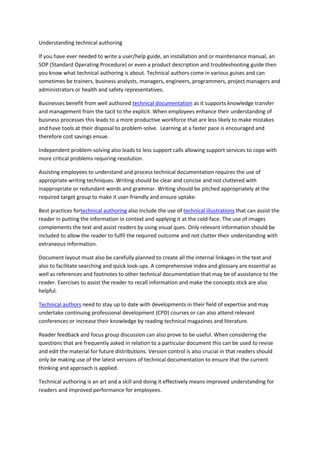
Technical Authoring
- 1. Understanding technical authoring If you have ever needed to write a user/help guide, an installation and or maintenance manual, an SOP (Standard Operating Procedure) or even a product description and troubleshooting guide then you know what technical authoring is about. Technical authors come in various guises and can sometimes be trainers, business analysts, managers, engineers, programmers, project managers and administrators or health and safety representatives. Businesses benefit from well authored technical documentation as it supports knowledge transfer and management from the tacit to the explicit. When employees enhance their understanding of business processes this leads to a more productive workforce that are less likely to make mistakes and have tools at their disposal to problem-solve. Learning at a faster pace is encouraged and therefore cost savings ensue. Independent problem-solving also leads to less support calls allowing support services to cope with more critical problems requiring resolution. Assisting employees to understand and process technical documentation requires the use of appropriate writing techniques. Writing should be clear and concise and not cluttered with inappropriate or redundant words and grammar. Writing should be pitched appropriately at the required target group to make it user-friendly and ensure uptake. Best practices fortechnical authoring also include the use of technical illustrations that can assist the reader in putting the information in context and applying it at the cold-face. The use of images complements the text and assist readers by using visual ques. Only relevant information should be included to allow the reader to fulfil the required outcome and not clutter their understanding with extraneous information. Document layout must also be carefully planned to create all the internal linkages in the text and also to facilitate searching and quick look-ups. A comprehensive index and glossary are essential as well as references and footnotes to other technical documentation that may be of assistance to the reader. Exercises to assist the reader to recall information and make the concepts stick are also helpful. Technical authors need to stay up to date with developments in their field of expertise and may undertake continuing professional development (CPD) courses or can also attend relevant conferences or increase their knowledge by reading technical magazines and literature. Reader feedback and focus group discussion can also prove to be useful. When considering the questions that are frequently asked in relation to a particular document this can be used to revise and edit the material for future distributions. Version control is also crucial in that readers should only be making use of the latest versions of technical documentation to ensure that the current thinking and approach is applied. Technical authoring is an art and a skill and doing it effectively means improved understanding for readers and improved performance for employees.
